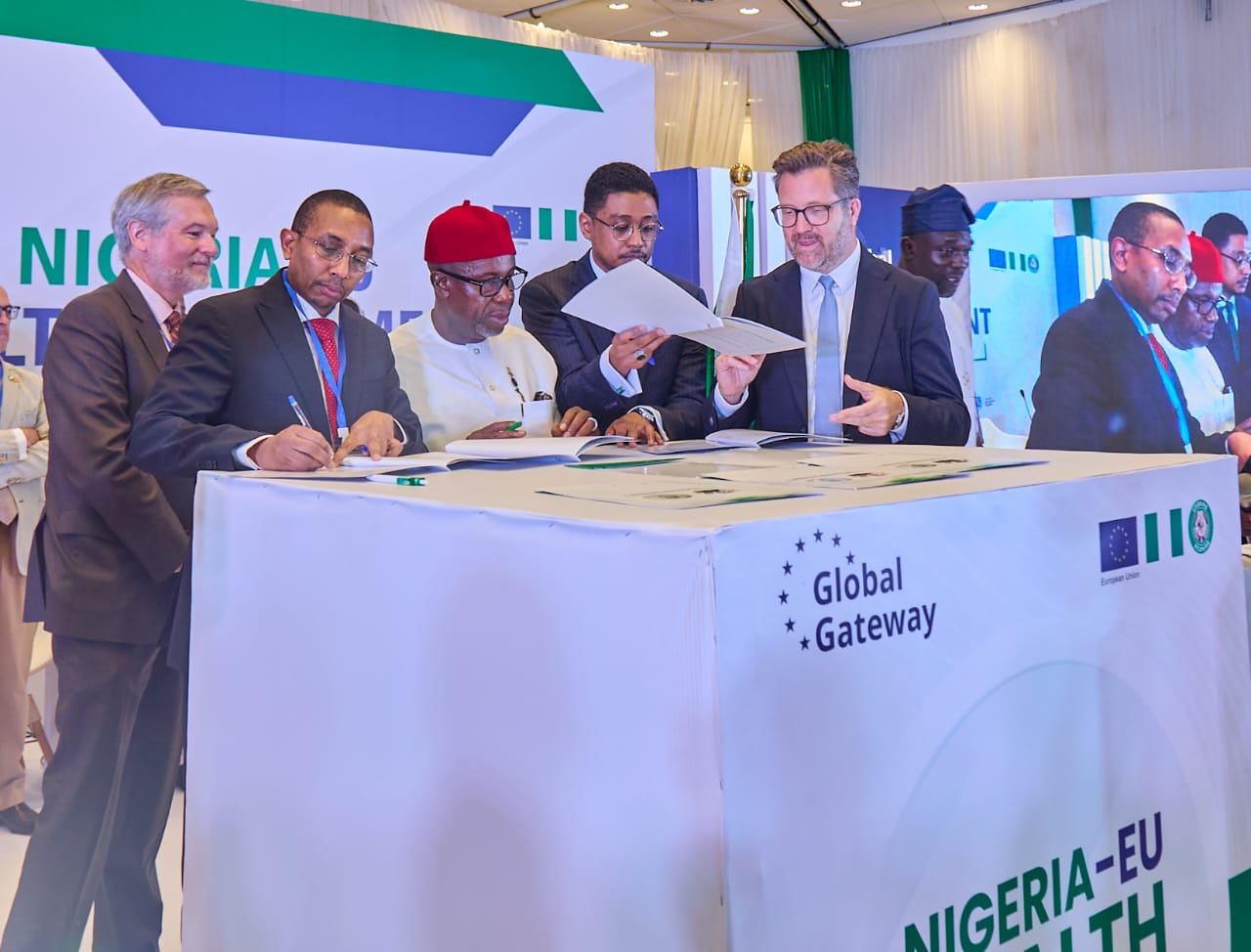FG, EU Seal Deals To Boost Local Drug Production, Spur Investment, Strengthen Reproductive Health In West Africa
•By Admin
ABUJA – IN a decisive move to transform Nigeria’s health economy, the Federal Government, in collaboration with the European Union (EU) and ECOWAS, on Thursday, signed three landmark agreements aimed at boosting local pharmaceutical manufacturing, stimulating investments, and strengthening reproductive health and rights across West Africa.
The agreements Enabling Local Manufacturing of Health, Immunisation and Nutrition Commodities in Nigeria (ELM-N), Quality Uplift for Advancing Local Industry in Medicine Standards (Qualimeds Nigeria), and Strengthening Reproductive Health and Rights (SRHR) in West Africa were formalised under the EU Global Gateway Manufacturing and Access to Vaccines, Medicines and Health Technologies (MAV+) initiative.
Speaking at the Nigeria-EU Health Investment Forum on Thursday in Abuja, Vice President Kashim Shettima, represented by Dr. Uju Rochas, Senior Special Assistant on Public Health, Office of the Vice President, said the agreements reaffirm the Tinubu administration’s resolve to build a sustainable, inclusive, and innovation-driven health economy.
He noted that President Bola Tinubu’s Executive Order on local production of pharmaceuticals and medical devices marked a turning point in Nigeria’s health sector.
“Through the Presidential Initiative for Unlocking the Healthcare Value Chain (PVAC) and complementary frameworks such as the Sector-Wide Approach (SWAp), this administration has taken concrete steps to strengthen health governance, stimulate investment, and promote local manufacturing,” he said.
Shettima reaffirmed the government’s commitment to creating an enabling environment for investors and innovators through predictable regulations, strong institutions, and public-private partnerships.
“Our message is clear: Nigeria is open for health investment, innovation, and impact. The President has declared that Nigeria’s health transformation will not be driven by aid and dependency alone, but by ownership, accountability, and innovation made in Nigeria, for Nigerians, and by Nigerians,” he added.
EU Ambassador to Nigeria and ECOWAS, Gautier Mignot, said the initiative demonstrates Team Europe’s shared commitment to improving health outcomes through strategic investments.
“Working alongside Nigerian authorities, the UN, and the private sector, we must build robust, resilient, and efficient health and social welfare systems to ensure prosperity for all,” Mignot said.
He revealed that the EU currently has a €45 million project in Nigeria and an additional €25 million in West Africa funded with support from the Agence Française de Développement (AFD) and the Bill & Melinda Gates Foundation focusing on reproductive, maternal, and child health.
“Beyond today’s projects, this event signals our shift from aid to peer-to-peer collaboration and from standalone projects to a dynamic investment strategy,” he added.
Minister of Budget and Economic Planning, Sen. Abubakar Bagudu, said the agreements align with Nigeria’s reform agenda to strengthen partnerships and expand investments in healthcare accessibility and affordability.
“The absorptive capacity of Nigeria’s economy is enormous. President Tinubu has shown the political will to take bold reforms that will place the economy on a sustainable growth path,” he said.
Also speaking, the Minister of Health and Social Welfare, Prof. Muhammad Ali Pate, represented by Dr. Olubunmi Aribeana, Director of Food and Drug Services, said the initiative aligns with the Renewed Hope Health Agenda, anchored on strengthening local production, expanding access to essential medicines and vaccines, and advancing sexual and reproductive health rights.
“Local production of health commodities is not merely an economic decision; it is a strategic health security priority to ensure that made-in-Nigeria products serve our people and the wider West African region,” Pate stated.
The forum, jointly hosted by the EU Delegation to Nigeria and ECOWAS, PVAC, and the National Institute for Pharmaceutical Research and Development (NIPRD), marks a significant milestone in Nigeria’s drive to achieve self-reliance in health production and accelerate access to quality healthcare for all.
•INDEPENDENTNG.

